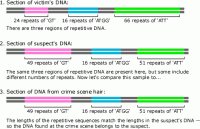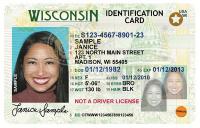-
France demands effective suspension of the Schengen open borders agreement
France will this week call for an effective suspension of the Schengen Agreement on open borders across Europe. The agreement was in 1985 in the town of Schengen in Luxembourg. It removes border checks within Europe, meaning that anyone. France will not call for a formal abrogation of the agreement, but would rather demand that all members of the Schengen Zone begin border identity checks, a move which amount to an effective suspension of the 30-year old agreement
-
-
Forge-proof authentication method to revolutionize security
Scientists have discovered a way to authenticate or identify any object by generating an unbreakable ID based on atoms. The technology uses next-generation nanomaterials to enable the unique identification of any product with guaranteed security. uses atomic-scale imperfections which are impossible to clone as they comprise the unmanipulable building blocks of matter. The researchers used atomic-scale imperfections which are impossible to clone as they comprise the unmanipulable building blocks of matter.
-
-
DNA identification may not be as reliable as previously thought

Increasingly important to criminal investigations, DNA analysis once required substantial samples of blood or other bodily fluids, but advances in the field now make it possible to produce a complete genetic profile of a suspect from just a few cells left behind — so-called “touch DNA.” A new study shows that secondary transfer of human DNA through intermediary contact is far more common than previously thought, a finding that could have serious repercussions for medical science and the criminal justice system.
-
-
Glowing fingerprints help fight crime
Fingerprint identification has been used as a key method by law enforcement and forensic experts for over 100 years. Researchers say that by adding a drop of liquid containing crystals to surfaces, investigators using a UV light are able to see invisible fingerprints “glow” in about thirty seconds. The strong luminescent effect creates greater contrast between the latent print and surface enabling higher resolution images to be taken for easier and more precise analyses.
-
-
Internal fingerprint sensor enables more accurate ID
In the 1971 film “Diamonds are Forever,” British secret agent James Bond uses fake fingerprints as part of a ploy to assume the identity of a diamond smuggler. At the time, sham prints were purely a futuristic bit of Bond gadgetry, but technology has since caught up. Quickly detecting “internal fingerprints” and sweat pores could make fingerprint sensors more reliable and less likely to be tricked by fake fingerprints.
-
-
Expert passport officers better than face recognition technology in detecting fraud
Face-matching experts at the Australian Passport Office are 20 percent more accurate than average people at detecting fraud using automatic face recognition software, new research shows. The study is the first to test how well people perform on this difficult but common operational task carried out by passport officers. “Our research shows that accuracy can be significantly improved by recruiting staff who are naturally good at face recognition - the so-called “super-recognizers” — and then giving them in-depth training in the use of the software,” said the study lead author.
-
-
Forensic facial examiners can be near perfect

In what might be the first face-off of its kind, trained forensics examiners from the FBI and law enforcement agencies worldwide were far more accurate in identifying faces in photographs than nonexperts and even computers. The new assessment provides “the first strong evidence that facial forensic examiners are better at face recognition than the rest of us,” says a face recognition researcher.
-
-
Automated voice imitation can defeat voice-recognition security
Voice biometrics is based on the assumption that each person has a unique voice that depends not only on his or her physiological features of vocal cords but also on his or her entire body shape, and on the way sound is formed and articulated. Researchers have found that automated and human verification for voice-based user authentication systems are vulnerable to voice impersonation attacks. Using an off-the-shelf voice-morphing tool, the researchers developed a voice impersonation attack to attempt to penetrate automated and human verification systems.
-
-
Residents of 4 states may need more than a driver license to board domestic flights
Residents of four states — New York, New Hampshire, Minnesota, and Louisiana – may soon need more than their driver’s licenses as a means of identification when boarding an aircraft for a domestic flight, DHS says. These states’ licenses do not meet the standards stipulated by DHS under the latest phase of the federal Real ID Act of 2005. Residents from these four states will have to present their passports with them, or some other means of DHS-approved identification, before being allowed on board.
-
-
Europeans concerned over thriving trade in fake, stolen Syrian papers
The EU countries trying to formulate a cohesive policy to deal with the hundreds of thousands of refugees trying to enter the EU zone are now facing a new problem: The burgeoning trade in stolen Syrian identity documents. Most European countries are yet to agree to accept more than a token number of Syrian refugees, but Germany and Sweden have made it known that while the EU is grappling with the issue, the asylum system in both countries would offer preferential treatment for Syrians. This preference has made Syrian passports into a must-have document for non-Syrian immigrants who would otherwise not be likely to qualify as refugees.
-
-
Bringing contactless fingerprint technology to market

Quickly moving through security checkpoints by showing your hand to a scanner seems straight out of science fiction, but work is being done to bring fast, touchless fingerprint readers out of the lab and into the marketplace. The touchless technology offers speed and a hygienic alternative to conventional fingerprint readers.
-
-
Determining the age of fingerprints
Watch the imprint of a tire track in soft mud, and it will slowly blur, the ridges of the pattern gradually flowing into the valleys. Researchers have tested the theory that a similar effect could be used to give forensic scientists something they’ve long wished for: A way to date fingerprints. Even the approximate age of a fingerprint can have a critical bearing on forensic results, as it can rule out some prints as being too old to be relevant to a crime scene. Military forensics experts would like to be able to date the multitude of fingerprints found on improvised bombs used by insurgents to winnow out prints of individuals who may simply have handled the components in a shop from those of the actual bombmakers.
-
-
Some 200,000 federal building to be affected by REAL ID as of 10 October

Beginning 10 October, security screeners in roughly 200,000 federal buildings may deny access to visitors who present a driver’s license or identification card from a state which is non-compliant with REAL ID rules. A passport or ID specially approved by the federal government may be used as proof of identity. The Government Services Administration (GSA) says there are 275,195 buildings which are owned and leased by the federal government as of 2014. Enforcement of the REAL ID Act has so far been limited to only 217 of these buildings.
-
-
California offers driver's licenses to undocumented immigrants
This year California has begun to offer y undocumented immigrants driver’s licenses, and tens of thousands of immigrants have been standing long hours in line at the Department of Motor Vehicles offices around the state to avail themselves of the new document. DMV officials say that of the 883,000 licenses issued so far this year, 443,000 were issued to undocumented immigrants. The officials estimate that by the end of 2017, the DMV will issue more than 1.5 million driver’s licenses to undocumented immigrants in the state.
-
-
U.S. tightens Visa Waiver Program security measures

Citizens of the thirty-eight countries which are part of the U.S. Visa Waiver Program may travel to the United States without having to obtain an entry visa if they plan to stay in the United States for a period not exceeding ninety days, and if they meet the requirements. Last Thursday, the Department of Homeland Security announced that it would tighten the security measures which are already part of the program, and add additional security measures to it.
-
- All
- Regional
- Water
- Biometrics
- Borders/Immig
- Business
- Cybersecurity
- Detection
- Disasters
- Government
- Infrastructure
- International
- Public health
- Public Safety
- Communication interoperabillity
- Emergency services
- Emergency medical services
- Fire
- First response
- IEDs
- Law Enforcement
- Law Enforcement Technology
- Military technology
- Nonlethal weapons
- Nuclear weapons
- Personal protection equipment
- Police
- Notification /alert systems
- Situational awareness
- Weapons systems
- Sci-Tech
- Sector Reports
- Surveillance
- Transportation
Advertising & Marketing: advertise@newswirepubs.com
Editorial: editor@newswirepubs.com
General: info@newswirepubs.com
2010-2011 © News Wire Publications, LLC News Wire Publications, LLC
220 Old Country Road | Suite 200 | Mineola | New York | 11501
Permissions and Policies
Editorial: editor@newswirepubs.com
General: info@newswirepubs.com
2010-2011 © News Wire Publications, LLC News Wire Publications, LLC
220 Old Country Road | Suite 200 | Mineola | New York | 11501
Permissions and Policies
